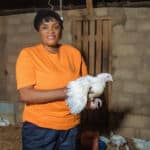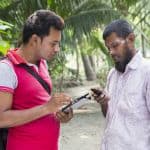Beyond Imagination: GE, Miller Center Helping Keep Moms, Children Healthy
It’s hard for those of us who grew up in relative comfort here in the United States to imagine the childhood of Kajira Mugambi, born in a Kenyan village. Some days, when there wasn’t food to eat, he drank a lot of water. It filled his empty stomach, but it also flooded his body with water-borne pathogens. Inevitably, he became sick.
Kajira remembers, barely able to put one foot in front of the other, walking with his mother five miles to the nearest medical clinic. Years later, after Kajira earned a degree from UCLA’s School of Law and became a member of the faculty, he never stopped thinking about the lives of the mothers and children in his village. He returned to found Village HopeCorps International, a public-health microenterprise that serves communities in rural Kenya.
The problem that Village HopeCorps International is trying to solve is similar to the problems addressed by all the social enterprises that gathered this summer in Nairobi for a three-day workshop – actually a kickoff event for a pilot called healthymagination Mother and Child. The pilot accelerates much-needed medical innovations in nine countries across sub-Saharan Africa. It is a partnership between Santa Clara University’s Miller Center for Social Entrepreneurship, where I work, and GE, the multinational corporation. GE is investing $20 million in the joint venture.
The 17 members of the healthymagination Mother and Child Program cohort are from Burundi, Democratic Republic of the Congo, Ethiopia, Ghana, Kenya, Rwanda, Nigeria, Zambia and Uganda. All, like Kajira, are leading social enterprises that address the region’s discouraging rate of child deaths from preventable causes.
Although their enterprises are viable and already making a difference, the entrepreneurs joined the Mother and Child pilot because, as one of them told me, “We need help organizing the work in a way that our enterprises can grow.” And we can help them do that.
Silicon Valley Mentors
Santa Clara University is in the heart of Silicon Valley. We take advantage of our location among legendary tech companies to recruit outstanding executive mentors to work with social entrepreneurs around the world.
In Nairobi, we introduced the entrepreneurs to our Global Social Benefit Institute (GSBI) methodology and mentoring style. Over the ensuing seven months, the healthymagination entrepreneurs will work with Silicon Valley executive mentors who will help them scale their social enterprises for greater impact. They will work on managing every aspect of their businesses: from mission statement, impact, business model, to financials and operations.
Simultaneously, experts from GE Africa will train the entrepreneurs in the use of medical products and services aimed at improving maternal and child health.
At the end of the mentoring phase, the entrepreneurs will be ready to stand before potential investors and make their case for funding.
How It Came Together
GE has been doing business in Africa for more than 100 years, but this is a first-of-its-kind social enterprise accelerator program.
You might wonder how tiny Miller Center was able to partner with giant GE for this program.
Sue Siegel, CEO of GE Ventures, was a member of our advisory board. She was aware of Miller Center’s track record working with social entrepreneurs. Siegel introduced us to GE’s healthymagination team, which creates initiatives like the Mother and Child Program.
When I joined Miller’s GSBI this past February from my previous job running an even smaller social-impact accelerator, GE and Miller Center had already forged the informal agreement to go with the program. I jumped in to work on it during my first week on the job, before the agreement was even signed. And a few short months later, there we were in Nairobi with a full cohort of entrepreneurs, ready to begin the program.
I want to point out how unusual it is to recruit excellent candidates and start a program that fast. Typically, we have a longer lead time – at least two-and-a-half months. For healthymagination Mother and Child, it was only three weeks.
The heathymagination team got down into the weeds with us and started gathering referrals. We approached other accelerators, as well as funders, impact investors and foundations. And we received referrals from the GE team in Africa.
We wanted to build a cohort of impact-focused enterprises that addressed health problems of sub-Saharan mothers and children living in poverty. Our definition of health issues was fairly broad. (For example, we looked at an organization educating people about malaria prevention with mosquito nets.) And we considered a number of business models: for-profit, nonprofit and hybrid. We accepted some early-stage organizations and some older enterprises, but they all have the potential to scale to reach larger numbers of people than they do today.
One of our very connected partners in Nairobi told me he was shocked that we got such a large and broad applicant pool, including some organizations he’d never encountered before. To me, that meant we had done a great job of unearthing some worthy groups that have been flying under the radar.
The GE heathymagination team understands that philanthropy has its place, but it’s not the only way to do good in the world. In my mind, social entrepreneurship – supported by big companies – is going to become more mainstream and less of a niche approach. Many corporations already have a corporate social responsibility arm that is focused on philanthropy. Through supporting social enterprises using those same funds and human capital, corporations can continue to make a positive impact in the world while simultaneously advancing their business goals. It’s also a win for organizations looking to retain employees through offering a way to use their skills for good. The healthymagination program is just one example – Miller Center has also engaged with Seagate Technology employees as mentors for a program with social entrepreneurs in Thailand and Sephora’s recent accelerator pilot has similar motivations.
It’s exciting to watch a large corporation like GE “get” it, and really walk the talk.
Marie Haller is program manager of the Global Social Benefit Institute at the Miller Center for Social Entrepreneurship, Santa Clara University.
Photo above: A GE ultrasound. Photos courtesy of GE
Homepage photo: The healthymagination Mother and Child Program cohort with GE and Miller Center executives in Nairobi, in July.
- Categories
- Health Care, Social Enterprise, Technology



